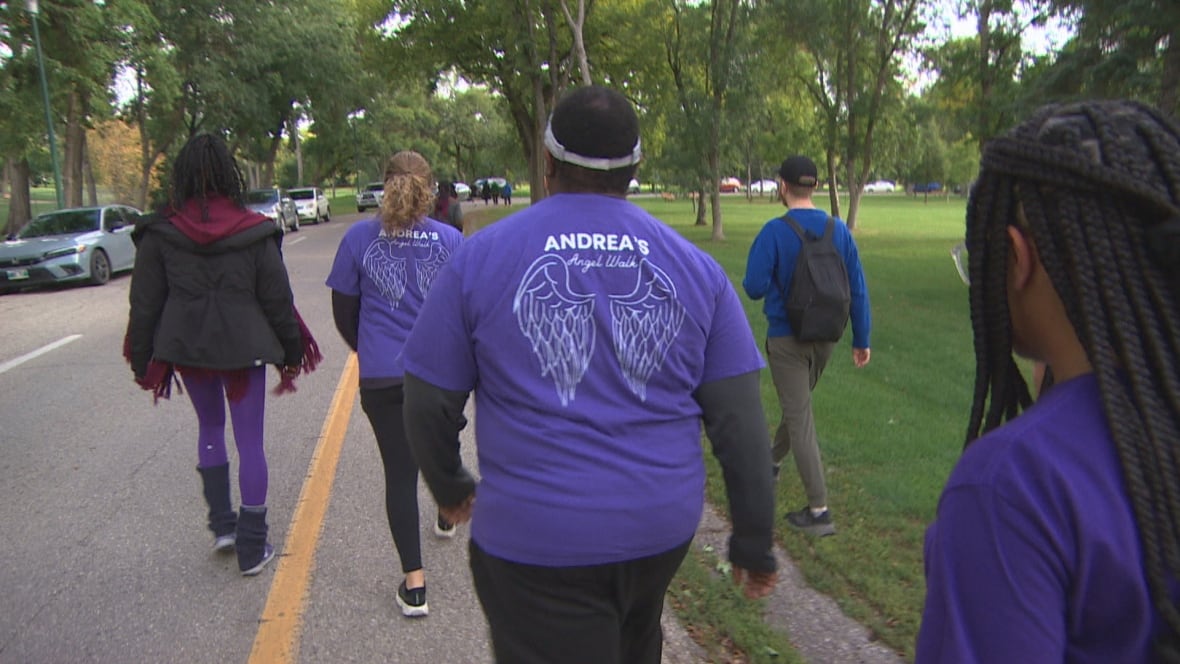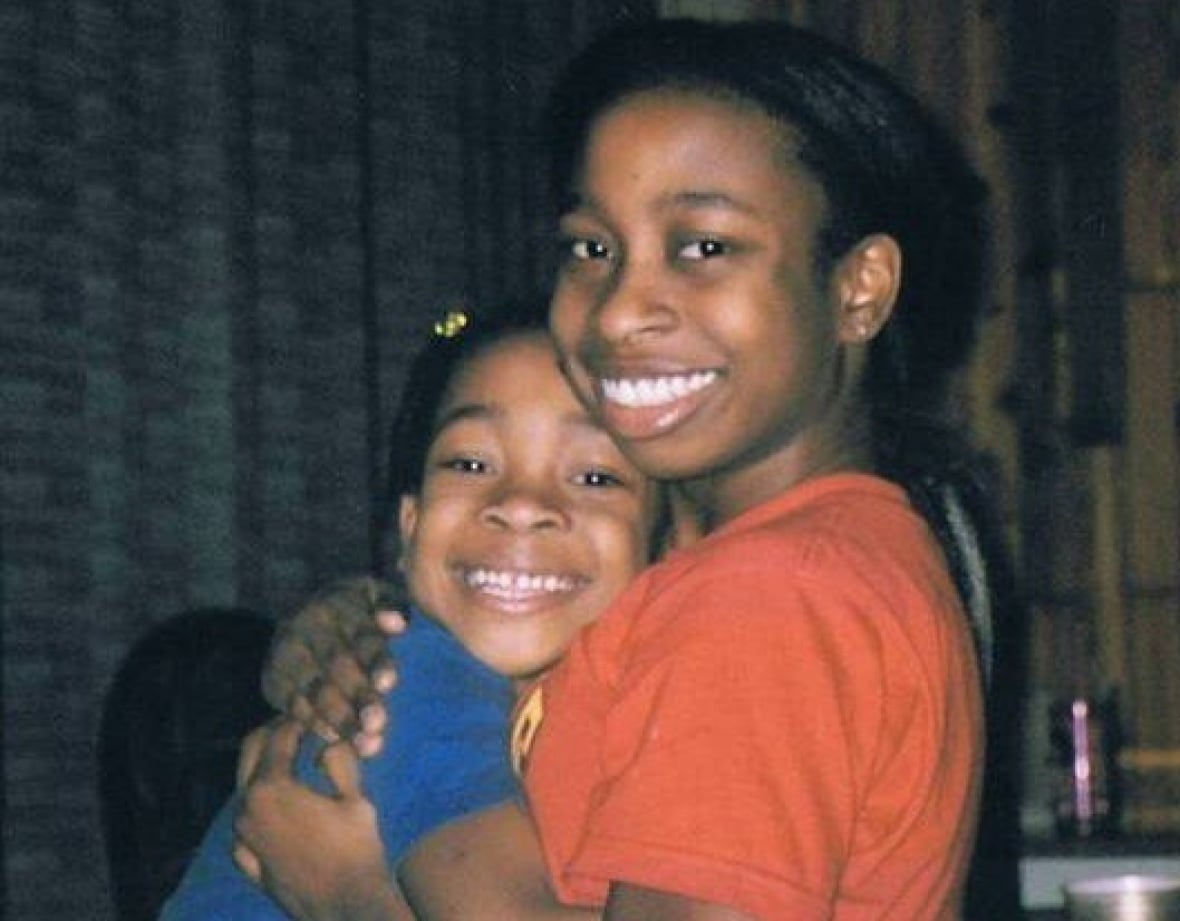A group of Winnipeggers looped through Kildonan Park on the weekend for the eighth annual Andrea’s Angel Walk, a fundraiser honouring the life of seven-year-old Andrea Ndukwu, who died in 2007 from complications of sickle cell disease.
Sickle cell disease is a genetic disorder — the most common inherited condition in Canada, according to Canadian Blood Services — that affects red blood cells. Instead of being round and flexible, the cells are crescent-shaped and hardened.
Sickle-shaped cells can get stuck in a person’s blood vessels, restricting blood and oxygen flow while causing pain and infections. Complications from sickle cell disease include severe chronic pain, stroke, kidney disease, heart failure and blindness.
This year’s Andrea’s Angel Walk, a five-kilometre walk/run, took place on Saturday morning. It was organized by the Sickle Circle of Manitoba, founded by Andrea’s older sister Beverly Ndukwu, who fondly remembers her sister’s “fun and angelic spirit” and lives with the disease herself.
 Walkers participate in the eighth annual Andrea’s Angel Walk on Saturday at Kildonan Park in Winnipeg. (Rudi Pawlychyn/CBC)
Walkers participate in the eighth annual Andrea’s Angel Walk on Saturday at Kildonan Park in Winnipeg. (Rudi Pawlychyn/CBC)
“Growing up with [sickle cell disease] I was very confused. I didn’t really know what was happening, why I would have pain,” Ndukwu said, describing her intense pain as a “stabbing knife” that beats across her wrists, stomach, legs and shins.
Because pain is a subjective, personal experience, she said her regular visits to the emergency room would often end with frustration.
“I just wouldn’t be believed. The doctors would say, ‘She’s faking it.’ And so we’d go back home and hope that it gets better,” Ndukwu said, adding her severe shin pain was often dismissed as shin splints.
She said everyone with sickle cell disease experiences it differently, but one of the hardest parts is the pain of not being believed. That disbelief can lead to longer emergency room wait times for patients in extreme pain, Ndukwu said.
“I don’t know anyone with sickle cell disease that hasn’t experienced some form of medical abuse,” she said.
LISTEN | Raising awareness about sickle cell disease:
The Weekend Morning Show (Manitoba)Raising awareness about sickle cell disease
Beverly Ndukwu is the founder and president of Sickle Circle of Manitoba (www.sicklecirclemb.com)
While sickle cell disease is actually quite common in Canada, Ndukwu said many medical professionals don’t know how to care for patients with the genetic disease because it predominantly affects marginalized populations.
Sickle cell disease is most common among people of African, Mediterranean, Middle Eastern and Indian descent, according to the World Health Organization.
“One of the main [symptoms] of sickle cell disease is pain. Pain is subjective, especially on someone of a certain colour coming in and saying, ‘I have pain.’ Historically, that’s been looked at and has been disregarded,” Ndukwu said.
The disease used to be rare in Canada, but is becoming more common with immigration. The WHO estimates more than 7.7 million people have sickle cell disease globally, with nearly 80 per cent of affected people living in sub-Saharan Africa.
Blood transfusions, pain medication and the drug hydroxyurea are often used to treat the disease. Houston said younger patients can be cured with bone marrow transplants, and new curative gene therapy has been introduced in the United Kingdom. However, it is not yet available in Canada.
Donald Houston, a hematologist at Health Sciences Centre who he treats people with sickle cell disease, was at Saturday’s event. He said he has nearly 150 adult patients with the disease, with a similar number of children receiving treatment in the pediatric unit.
“This is something that Manitobans live with and we all have to be supportive,” Houston said.
“We’re working to build a program for care for patients with hemoglobin disorders like sickle cell disease and [Andrea’s Angel Walk] just helps build momentum toward that,” he said. “Part of the challenge is to teach providers to listen.”
There’s still a long way to go before all sickle cell disease patients across Canada are treated with a consistent standard of care, Ndukwu said.
“At the moment, care is different in every province for sickle cell disease.… I think it’s important to have, in my opinion, Canada-wide protocols,” she said, adding she would like to see patients receive IV fluids and pain management within 30 minutes of arriving at an emergency room.
 Beverly Ndukwu, right, says her younger sister Andrea had a bright and angelic spirit that continues to motivate her to advocate for people with sickle cell disease, a genetic condition she has too. (Submitted by Beverly Ndukwu)
Beverly Ndukwu, right, says her younger sister Andrea had a bright and angelic spirit that continues to motivate her to advocate for people with sickle cell disease, a genetic condition she has too. (Submitted by Beverly Ndukwu)
Ndukwu said she’s seen sickle cell awareness grow in the nearly 18 years since she lost her sister. Last year, Manitoba Health added sickle cell testing to its newborn screening program — a move Ndukwu said shows the province is moving in the right direction.
Health Minister Uzoma Asagwara attended the event on Saturday, as the province officially recognized September as Sickle Cell Awareness Month for the first time.
Recent progress and Andrea’s bright spirit are constant motivators, Ndukwu said as the sun shone over walkers and runners at Kildonan Park on Saturday morning.
The September event has had sunny weather every year so far, she said.
“There’s always sun at some point, no matter what the forecast is. I think that’s Andrea,” she said.
“She was just such a ray of sunshine.”

